
Soul music is a passionately expressive musical genre that focuses on universal themes and simple lyrics interwoven with jazzy rhythms, virtuosic vocals and bluesy instrumental backgrounds. Merriam-Webster Dictionary defines soul music as "characterized by intensity of feeling and earthiness." Many of the world's most renowned vocal artists are soul singers and are appreciated in nearly every country and culture.
Soul music was born in the 1960s and '70s from a combination of 1950s rhythm and blues and older African-American music genres -- blues and gospel. Because white American society shunned their views, African-Americans used music to communicate and express cultural concerns and beliefs. After the Civil War, many African-Americans worked in the vaudeville tradition from the 1880s to 1920s, where performers from every ethnic and social background were welcomed. The popularity of vaudeville paved the way for the general acceptance of new African-American musical genres like jazz, rhythm and blues and soul music. Soul combined the longing of blues, the passion of gospel and the drama of vaudeville to form a whole new musical genre. link
Lisabeth Hughes, "What Is the Meaning of Soul Music?" - eHow. Sketch credit: Fotolia.com
|
|
Is there a difference between Soul and Rhythm and Blues music? R&B originated in the 1940's with deep roots in jazz and influenced by gospel and blues. Soul music became popular from the 1950's onwards and is a combination of R&B, gospel and Doo-Wop, evolving "into a form of funky, secular testifying."
For the purposes of this diary, I do not make a distinction between the two. Soul music is considered one of the styles of R&B
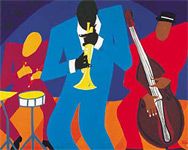
R&B encompasses a variety of styles including soul, Motown, funk, disco, rap, hip-hop, doo-wop, black rock 'n' roll, club blues and jump blues... Characteristics of R&B include soulful singing over a strong backbeat, commonalities in rhythm, bands divided into a rhythm and horn section, repetition of rhythms, verses and notes, and often complex blending of instruments...
R&B came about during a demographic shift in America that began just before WWII when large segments of the black population moved from the rural South to cities in the Midwest, Northeast and West Coast. This migration created a young, urban black audience with a growing taste for up-tempo dance music. Many in the record industry seized the opportunity by starting independently owned labels and radio stations targeting the black audience. The popularity of R&B music also helped to fuel the appetite of young white audiences for rock 'n' roll...
R&B music has had a strong impact on American culture for blacks and whites alike. The genre has influenced other types of music such as rock 'n' roll and also dancing, fashion, language and attitudes. As much as the black community embraced R&B music, so too did large portions of the white population, especially the youth. It is arguable, therefore, that R&B music helped to promote understanding and unity between different cultures. link
Lesley Henton, "About R&B Music" - eHow. Sketch credit: Black History Month.
|
|

In no particular order, here are some of the best songs from these two genres of music. With their memorable tunes and unforgettable lyrics, the contributions of these legendary performers have been enormous and left an indelible mark in defining and popularizing American culture around the world. It is indeed music for the soul.
1. "What's Going On?" by Marvin Gaye
In this politically-charged song by arguably the best male soul singer ever, "What's Going On?" is a brilliant, anguished cry in which Gaye questions the futility of war and aggression and attempts to understand the societal madness developing around him.
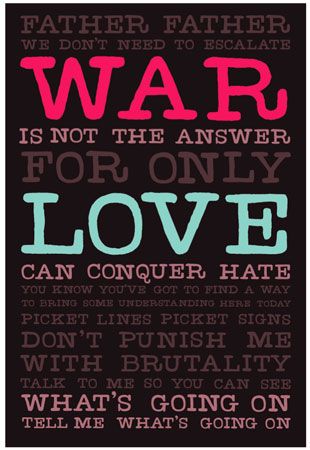
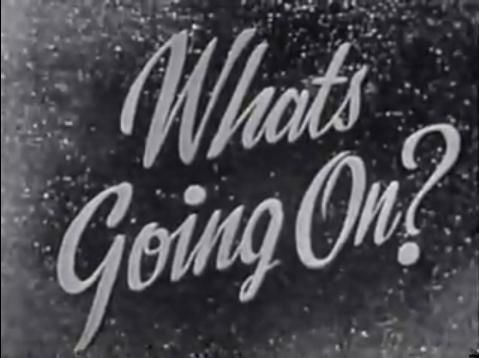
1. "What's Going On?''was a timely record that moved a generation at a time when there was much commotion throughout not just the United States but also the entire world. link
2. Gaye was inspired by the stories his brother Frankie told him when he came back from the Vietnam war... Gaye wrote this when he could no longer could take refuge in his love songs. His marriage was in shambles (although the divorce wouldn't be final until 1977), Tammi Terrell (his partner in song and romance) collapsed into his arms during a concert and died in 1970, drug use was pervading the inner city culture and Malcolm X, Martin Luther King, and Robert Kennedy were all gunned down. link
|
|

2. "Respect" by Aretha Franklin
Aretha Franklin was already known as the "Queen of Soul" when she appeared on the cover of TIME magazine in May 1968. "Respect" was written and originally recorded by Otis Redding in 1965. When Franklin's song reached the top of the music charts in 1967, Redding playfully described her version as "that little girl done stole from me."
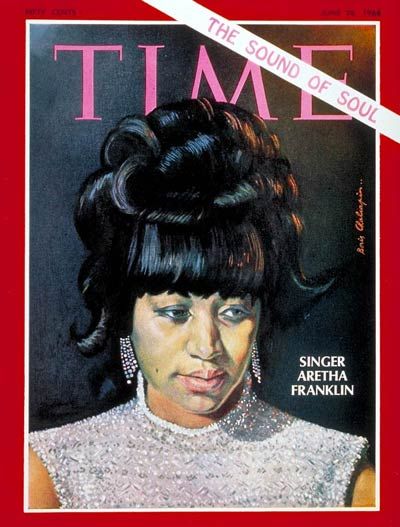
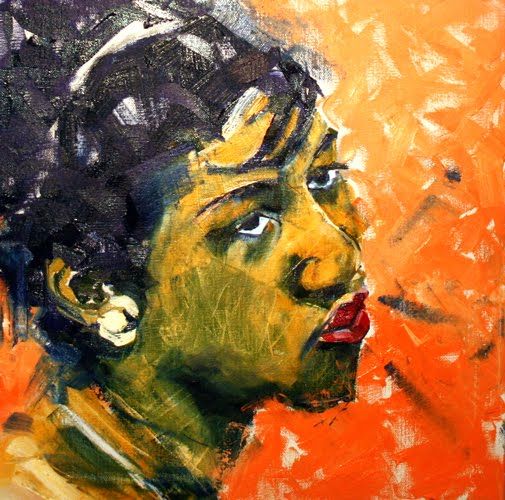
1. "Respect" has appeared in dozens of films and still receives consistent play on oldies radio stations. In the 1970s, Franklin's version of the song came to exemplify the feminist movement. Although she had numerous hits after "Respect", and several before its release, the song became Franklin's signature song and her best-known recording. link
2. Franklin had just signed with Atlantic Records, and when her single "I Never Loved A Man The Way I Loved You" became a hit, and Atlantic quickly arranged the sessions that produced "Respect" so she could put out an album to accompany the single. Aretha went on to release her biggest hits with Atlantic and became known as the "Queen Of Soul." This has been used in many movies, including Platoon, Forrest Gump, Mystic Pizza, and Back To School. link
|
|

3. "Theme from Shaft" by Isaac Hayes
Isaac Hayes wrote as well as performed this theme song for the movie Shaft. In the lead role, Richard Roundtree played a detective and the film was characterized by the Library of Congress for being "culturally, historically, or aesthetically significant."
In 1972, the Theme from Shaft won Hayes the Academy Award for Best Original Song.
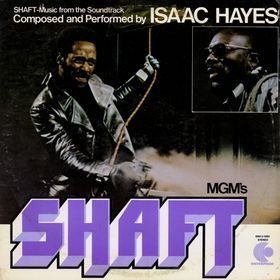

1. This was featured in the 1971 movie of the same name starring Richard Roundtree. It was remade in 2000 starring Samuel L. Jackson as Shaft. Hayes made an uncredited appearance in the remake, but that wasn't what he had in mind. According to Q magazine, Hayes agreed to write the Shaft theme after being promised the lead role but the promise wasn't kept - he didn't even get an audition. link
2. Hayes was a songwriter for Stax records before he became a successful recording artist. He wrote some hits for Sam & Dave, including "Soul Man" and "Hold On I'm Coming." Hayes explained in an interview with National Public Radio: "The character Shaft was explained to me: a relentless character always on the prowl, always on the move. I had to create something to denote that." link
|
|

Here are the rest of the songs included in the diary poll.
| 4. "In the Midnight Hour" by Wilson Pickett.
This was Pickett's first hit. He went on to become a Soul legend and was inducted into the Rock And Roll Hall Of Fame in 1991.
Steve Cropper and Pickett wrote this at the Lorraine Motel, which was located near the Stax studios in Memphis. On April 4, 1968, Martin Luther King Jr. was shot there while standing on the balcony. link

5. "My Guy" by Mary Wells.
"My Guy" is a 1964 number-one hit single recorded by Mary Wells for the Motown label. Written and produced by Smokey Robinson of The Miracles, the song is a woman's dedication to the goodness of her man ("There's not a man today who could take me away from my guy"). The single became the biggest hit ever for Wells, Motown's first female star, and reached the top of the Billboard Hot 100 pop singles chart. The song led the Cashbox magazine R&B chart for seven weeks. "My Guy" also happened to be Wells' last hit single for Motown, excepting duets she recorded with label mate Marvin Gaye. link
This was the song that broke up The Beatles famous monopoly on the Top 5 US chart positions in May of 1964. link

6. "Let's Stay Together" by Al Green.
This song is about an unconditional love where you are determined to stick it out through good times and bad. It's a very popular wedding song.
This has appeared in such movies as The Ladies' Man, On the Line, How to Lose a Guy in 10 Days, and Munich. Perhaps the most famous cinematic use of the song was in the scene from the film Pulp Fiction, where it is playing in the background... According to Rolling Stone magazine's Top 500 songs, after Willie Mitchell gave Al Green a rough mix of a tune he and drummer Al Jackson had developed, Green wrote the lyrics in 5 minutes. link
|
|


A Note About the Diary Poll
I know this for a fact that there are a whole lot of you on this Daily Kos who know a hell of lot more about music than I do. So, don't give me any grief if I didn't include your favorite song in this diary. :-)
This is hardly the "best of" list but, rather, includes a few of the better songs. Feel free to talk about contemporary soul and R&B songs as well as hip hop and funky music.
You can look up more of your favorites on these two lists
And, don't forget to take the diary poll.


